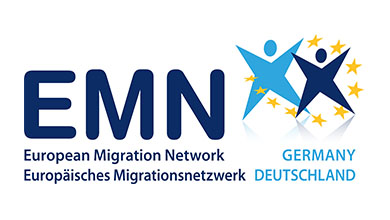EMN Conferences: International students in the EU ,
The German EMN contact point presented the results of a new EMN study at two conferences in Stockholm and Vienna. At the same time, the events provided an opportunity to compare practices in different EU member states.
 At the EMN Conference in Stockholm Bernd Parusel (Swedish EMN Contact Point) discussed with Paula Hoffmeyer-Zlotnik (formerly German EMN Contact Point) and Hanna van der Linden (Dutch EMN Contact Point).
Source: EMN|BAMF
At the EMN Conference in Stockholm Bernd Parusel (Swedish EMN Contact Point) discussed with Paula Hoffmeyer-Zlotnik (formerly German EMN Contact Point) and Hanna van der Linden (Dutch EMN Contact Point).
Source: EMN|BAMF
Two events of the European Migration Network (EMN) in spring 2019 were dedicated to the topic of international students: The annual conference of the Swedish EMN contact point on 8 May 2019, and the "EU Migration Talks" of the Austrian EMN contact point on 12 June 2019. The German EMN contact point took part in both events and presented the results of a new EMN study. The study examines what measures EU Member States and Norway are taking in order to attract and retain international students from third countries. The German contribution to the study is available via the link in the right-hand column.
Exchange with authorities and universities
The focus of both conferences was an exchange between universities and administrative bodies. In Stockholm, for example, several universities presented measures and initiatives designed to attract international students and to facilitate their transition into the Swedish labour market – for example student-run blogs, presence at university fairs or direct contact with prospective students. In Germany, the website www.study-in.de provides uniform and easily accessible information. Through its strong international presence and network, the DAAD also contributes to making Germany known as a destination for international students.
Comparative view
Both conferences provided possibilities for a comparative view of the situation in Sweden and Austria as well as in the Netherlands and Germany. These are countries with quite different situations: In Austria and the Netherlands, the proportion of students from other EU countries is very high, whereas Germany attracts about 75 per cent of its international students from non-EU countries. In Sweden and the Netherlands, the proportion of courses offered in English is significantly higher than in Germany, which makes these countries attractive for international students. At the same time, the majority of international students in Germany already have a good knowledge of German at the beginning of their studies, which in turn facilitates the transition to the labour market. The transition is also facilitated by a comparatively liberal regulation of stay after graduation: graduates of German universities can stay in the country for up to 18 months in order to find a job that corresponds to their degree. In the Netherlands, it is 12 months; however students have three years to apply for their "orientation year". They can therefore return to their country of origin for a certain period and then re-enter the country.
Cooperation is crucial
At both conferences, it became clear that good cooperation between embassies, immigration authorities and universities is crucial: it creates transparency for prospective students and all other stakeholders involved, from the initial application to a university to issuing the residence permit. Good cooperation can also lead to faster processes and better information for students about their residence situation. In the Netherlands, universities have concluded special agreements with the immigration and naturalisation authorities through which they themselves apply for residence permits for international students. This speeds up the process considerably; usually residence permits are issued within 10 working days. In Germany this often takes much longer. Overall, both conferences made it clear that it is worth looking at other Member States in order to identify best practices there.

